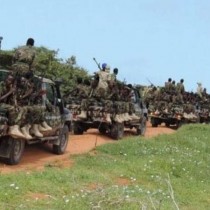ALSO IN THE NEWS

Somalia: Jubbaland Massacre is not acceptable
Sunatimes.com - Violence Is Not Acceptable
The reports of Jubaland violence is disheartening for the locals who have been struggling to cope with severe drought. The people in that region said that they did not get enough rains last season and life there is very hard for them as most of boreholes dried up and very difficult to get water for their livestock and for their own use for cooking.
There also is food shortage coupled with violence in other regions in the country. For instance, there are violence in the central regions of Galmudud and Hirshabelle. In Sough West, there is foodshotage in Hudur, despite UN delivering aid by air in the last few days. Inflation has hit in many areas in Puntland where the authority has introduced a new rule which is expected to protect the local currency against the US Dollar exchange rate in the Puntland market. The rule is meant to elevate the hardship from the poor.
It is underreported fact that the Somali economy has been badly damaged by Coronavirus pandemic like the rest of the world, but what exacerbates the Somali situation is the political instability and threat of violence.
The most vulnerable of population (women and children) are hit in all regions and they need urgent humanitarian assistance, because the people can not have access to buy food in local markets because of violence or they cannot afford the high prices in US Dollars.
It is also undeniable fact that the remittance money coming from Somali diasporas to their families back home is seriously reduced by covid19 which have hit their incomes and businesses mainly in Europe and US. The rich countries can afford to help their people in times like this but Somalis are reliant on livestock, farming, remittances and goodwill of the international donors.
Analysts believe that Somalis can not do much about the natural disasters, but what they can effectively mitigate is the violence that they are responsible of... let them understand that any form of violence is not acceptable in Somalia today.
The people who live in the rural areas can be helped if the roads as safe. The unnecessary suffering can be dealt with it effectively, if the infrastructure is allowed to be rebuilt or repaired and that responsibility lies with local civil Society groups who have interest in public good.
The International friends of Somalia can only help the people if the people are willing first to help themselves. The security is the most important aspect for human development; if there is no security, surely there will be no development whatsoever.
At the end of the day the blame lies with the Civil Society groups led by the local traditional leaders, the women, the business community, youth and farmers and so on and so for. It is clear to all that politicians in every level have failed to work for the common good or manage their differences peacefully to bring about a tangle peace and developmental projects.
One thing is for sure that their failure will come back to their constituencies. The local civil society groups have to account their local and national politicians and the incompetent individuals should be removed and shamed as soon as possible, if locals want to benefit the projects made available to them by the International community ( UN Fishing project for Hobiyo community is the latest). Otherwise, the unnecessary suffering will continue needlessly, and international donors who have been helping the most vulnerable, will eventually get what is called ‘donor fatigue’. The end.
By Mohamed Mohamud Adde
The author is an academic and an Independent Somali Political Analyst.
Leave a comment
| Copyright © 2009 - 2024 Sunatimes News Agency All Rights Reserved. |
| Home | About Us | Diinta | Reports | Latest News | Featured Items | Articles | Suna Radio | Suna TV | Contact Us |
 0
0 









Somalia: Jubbaland Massacre is not acceptable
Sunatimes.com - Violence Is Not Acceptable The reports of Jubaland violence is disheartening for the locals who have been struggling to cope with severe drought. The people in that region said that they did not get enough rains last season and lif